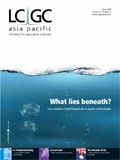Agilent tours Asia Pacific region
Agilent tours Asia Pacific region; Instrumental analysis exhibition; Joint research and development agreement
Agilent tours Asia Pacific region
Agilent kicked off a world tour of the Asia Pacific region in Bejing (China) in March to showcase its new range of gas chromatography (GC) and gas chromatography–mass spectrometry (GC–MS) instruments. Since then, the tour has presented the new instruments' features to more than 4000 scientists in 50 cities.
Each country launched the new products with their own unique spin. There was a magic show in Korea, a seminar held at the Melbourne zoo, and a confetti cannon launch in Thailand featuring cheerleaders and quiz games.

The country manager for Greater China, Yi Ping Mu, opened the event in Bejing with an overview of Agilent's life sciences and chemical analysis (LSCA) business. This was followed by a talk by vice president for LSCA, Steve Leung, on the new 7890A GC and 5975C GC–MS with GC. Over 20 journalists attended the event.
The Korean leg of the tour started with a magician waving a multi-coloured, oversized flag and ring of fire, with the new GC appearing from a box. Customers were then given an overview of 7890A's proprietary capillary flow technology (CFT).
Similar events took place across Taiwan, Japan, Australia, Singapore, Malaysia and Thailand. India was the final stop of the tour and concentrated on Mumbai and Delhi.
Sui-Ching Low, Asia-Pacific marketing communications specialist at Agilent, said: "The region's fast economic growth is being led by China and India. The chromatography market in the region in general is driven by high growth, especially in high-end instrumentation as a result of an increase in R&D funding, as well as the governments' investments in academic research."
For more information about the company visit www.agilent.com
Instrumental analysis exhibition
The Beijing Conference and Exhibition on Instrumental Analysis (BCEIA) is a biennial event that will be held this year from 18–21 October. This event is sponsored by the China Association for Instrumental Analysis and is supported by the Ministry of Science and Technology (People's Republic of China).
The 12th BCEIA will be held at the Beijing Friendship Hotel (conference) and the Beijing Exhibition Centre (exhibition). The exhibition will take place at the same time as the conference.
The exhibition centre, with a total floor area of approximately 15000 m2, will house the exhibits of the recently developed analytical instruments, life science instruments, instruments for environmental protection, laboratory equipment, food analysis instruments and chemical reagents from all over the world. Associated technical seminars, business talks and an instrument development forum will be held simultaneously.
Additionally, a plenary session with six invited lectures and eight separate sessions for oral and poster presentations in the field of electron microscopy and material science, mass spectrometry, optical spectroscopy, chromatography, magnetic resonance, electroanalytical chemistry, analytical techniques in life sciences and environmental analysis will be featured.
For more information about this event visit the website at www.bceia.org
Joint research and development agreement
SGE Analytical Science has announced that it has entered into a Memorandum of Understanding under an Australian government Commercial Ready grant with Sydney-based Australian Proteome Analysis Facility (APAF).
APAF specializes in proteomics applications from early stage research through to protein biomarker discovery for its customers. SGE's liquid chromatography platform is suitable for use in many different proteomics applications. The companies plan to collaborate on the development and commercialization of new chromatography products, predominantly for the protein biomarker discovery markets.
APAF will publicise SGE's LC technologies under its services and skill training programmes to its customers and develop new ProteCol kits for a variety of applications. Once feasibility is established, customers can then purchase the kits directly from SGE and its OEM partners.
For more information visit SGE's website at www.sge.com

Measuring Vitamin K1 Concentrations in Dogs with Chronic Enteropathy Using LC–MS/MS
May 14th 2025A joint study between the University of Tennessee (Knoxville, Tennessee) and the University of Pennsylvania School of Veterinary Medicine (Philadelphia, Pennsylvania) compared directly measured vitamin K1 (vitK1) concentrations in healthy dogs and dogs with chronic enteropathy (CE) using liquid chromatography tandem mass spectrometry (LC–MS/MS); they also investigated whether supplementation of vitK1 in dogs with CE would significantly increase vitK1 concentrations.
HPLC 2025 Preview: Fundamentally Speaking (Part 2)
May 14th 2025Michael Lämmerhofer from the Institute of Pharmaceutical Sciences, University of Tübingen, Germany, spoke to JFK Huber Lecture Award winner of 2024 Torgny Fornstedt, professor in analytical chemistry and leader of the Fundamental Separation Science Group, Karlstad University, Sweden, about his pioneering work in high performance liquid chromatography (HPLC) with a focus on fundamentals, ion-pair chromatography, and oligonucleotide applications.

.png&w=3840&q=75)

.png&w=3840&q=75)



.png&w=3840&q=75)



.png&w=3840&q=75)


















